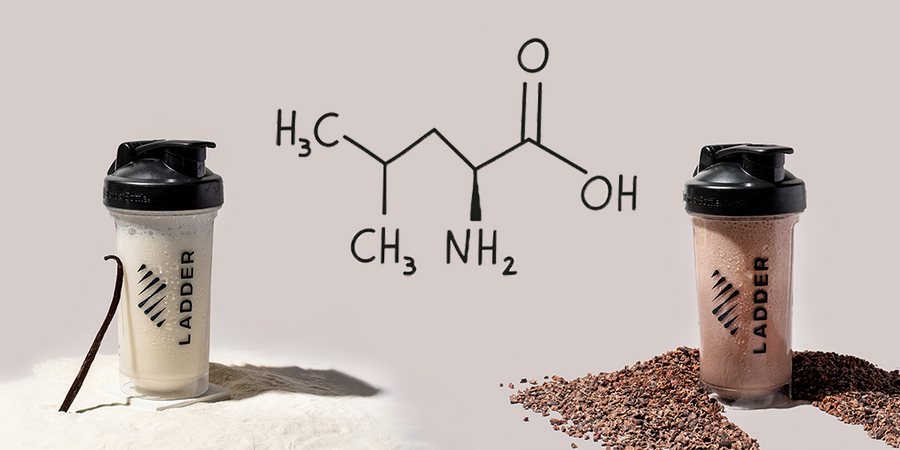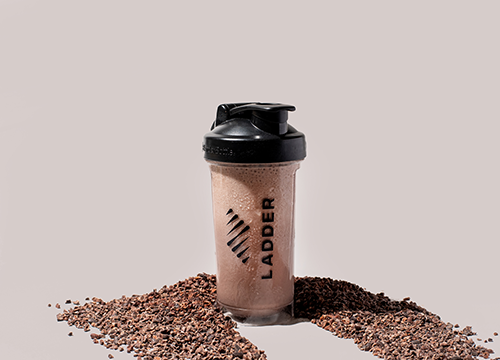
The Amino Acid That Matters Most for Muscle
By Michael Martin
As the building blocks of protein, amino acids play a key role in muscle growth and repair.
If you think of amino acids as a staff of 20 working to help you build muscle, one in particular — leucine — would be the head trainer, the star of the show, the CEO of Your Serious Gains, Inc.
So why is leucine so important for building muscle, and what's the best way to get the right amount to realize your fitness goals? Here's what you need to know.
Kickstart recovery and reduce muscle soreness with LADDER Whey and Plant Protein!
.
What Does Leucine Do in the Body?

Leucine is one of three branched-chain amino acids (BCAAs), along with isoleucine and valine. They're so named because they all have the same branched structure.
"Originally it was thought that all three BCAAs play a direct role in muscle building," says Paul Falcone, senior scientist at LADDER. "But research indicates that much of the effect of branched-chain amino acids is really driven by leucine."
That's because leucine is key in the process of muscle protein synthesis, which enables muscle hypertrophy (growth).
Leucine has the ability to directly signal mTOR, one of the major nutrient sensor molecules and master regulators in the body that's known for anabolic (growth) signaling. This helps make muscles absorb protein, which is key for their preservation and growth.
In this way, leucine is both a building block at a construction site and the contractor directing the process, Falcone says. Because it plays this dual role, it's the most important amino acid for muscle building.
"Leucine's ability to drive muscle protein synthesis through mTOR is very useful, especially post-workout," says Falcone. "It stimulates the rebuilding process to help your muscles grow back bigger and stronger."
.
What Are The Benefits Of Taking Leucine?

Leucine is an essential amino acid — our bodies can't produce it, so it needs to come from our diet.
Leucine can be found in many foods, including dairy, seeds, beans, and legumes. You can also boost your intake of leucine through supplementation. LADDER Whey Protein and LADDER Plant Protein both provide BCAAs — including leucine — to help support muscle growth and recovery.*
Here are two potential benefits of adding leucine to your diet.
1. Muscle Mass and Strength
Leucine helps to stimulate muscle protein synthesis and may also help prevent the breakdown of muscle proteins after intense exercise or severe stress.
Research suggests taking a protein supplement which contains leucine may also help to guard against the loss of muscle mass that often occurs as part of the aging process.*
2. Skin and Bone Health
Research suggests leucine may have a positive effect on skin health and bone health. Just as leucine enables protein synthesis to muscle, it also helps to enable growth and repair of skin and bones.*
.
What Foods Are High in Leucine?
Because leucine isn't produced by the body, we need to consume it through food or supplements.
Generally, animal-based proteins have the highest amounts of leucine.
According to the USDA FoodData Central, some of the foods that contain the most leucine per serving include:
- Chicken
- Beef
- Pork
- Tuna
- Milk
- Cheese
For most adults, the current recommended daily intake (RDI) for leucine is 17.7 mg per pound of body weight. That means a 180-pound person should consume about 3,186 mg of leucine each day.
But if you're highly active, you might need more protein — and therefore leucine — to realize your fitness goals, especially if you're looking to put on muscle mass.
.
Should You Take Leucine?

It's best not to think of leucine as a separate supplement to add to your routine — like, say, beta-alanine — but rather as an indicator of protein quality, Falcone says. A quality protein supplement will provide the right amount of leucine.
"The amount of leucine that you have in protein is important," Falcone says. "But leucine is not going to be effective on its own. It's effective in the right amount, as a part of an essential amino acid blend or protein supplement. The leucine content of your protein is a major driver of its effect on muscle building."
According to a 2017 position stand by the International Society of Sports Nutrition, your protein supplement should contain 700 to 3,000 mg of leucine per serving, in addition to a balanced array of essential amino acids.
LADDER's protein supplements, which are NSF-Certified for Sport, are carefully formulated to contain the optimal balance of ingredients — such as leucine — to help you build muscle and power through your workouts, and to recover faster.*
*These statements have not been evaluated by the Food and Drug Administration. This product is not intended to diagnose, treat, cure, or prevent any disease.



